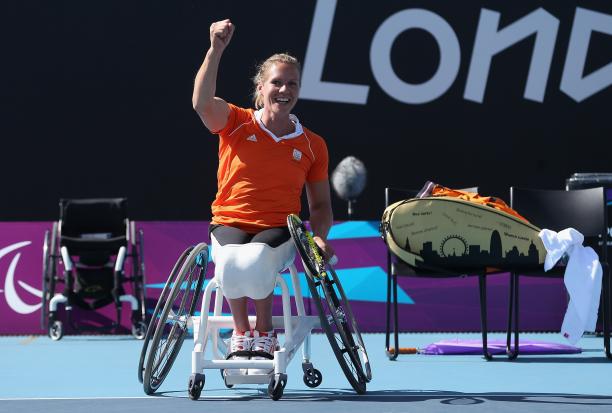No. 6: Esther Vergeer retires but remains involved
26.12.2013Wheelchair tennis player Esther Vergeer left the court as one of the greatest Paralympians of all-time and has committed to staying involved in the Movement.
 Esther Vergeer won gold in the women's wheelchair tennis singles competition on Day 8 of London 2012.
© • Getty Images
Esther Vergeer won gold in the women's wheelchair tennis singles competition on Day 8 of London 2012.
© • Getty Images
“There’s been so many highlights, but maybe the best match for me was winning the gold medal in Beijing in 2008.”
When the Netherlands’ Esther Vergeer retired on 12 February, she left wheelchair tennis with a winning streak of 470 consecutive matches, 668 straight weeks at world No. 1, eight Paralympic medals and 44 Grand Slam titles.
She was arguably the greatest individual to have ever played the game and one of the greatest Paralympians and ambassadors of the Paralympic Movement in history.
Everybody knew, though, at some point she’d be putting the racket away.
“After winning so many matches and so many competitions, I thought, maybe it is time to retire and use my knowledge and my experience and go for some other challenges,” Vergeer said.
Her retirement came several months after clinching her fourth Paralympic gold in the women’s singles final at London 2012 – the victory that also extended her winning streak to 470.
The decision came after months of contemplation and doubt about what to do.
“After the London Paralympic Games, I was thinking about what do I really want and where do I want to go,” Vergeer said. “Being an athlete and being a tennis player for me was one of the best things that I could have ever done – travelling around the world playing the game that I love.
“But there was some doubt, and I was thinking about other things and other challenges that I could have and other things I could achieve. Eventually I decided that those other challenges were way more. It was time for other challenges and time to work on other things.”
Going 10 years without a defeat on court to end her career, Vergeer served as an inspiration to many ever since she took up the game at age 12. In the final decade of her career, Vergeer won 120 successive tournaments, beat 73 different opponents, won 95 matches 6-0, 6-0 and dropped just 18 sets of tennis.
She stores the majority of her trophies and awards at her parents’ house.
“There’s been so many highlights, but maybe the best match for me was winning the gold medal in Beijing in 2008,” Vergeer said.
“I was match point down, and I felt a lot of pressure on my shoulders for having to win that gold medal. Being able to turn it around and being mentally tough enough to win that gold medal was the best moment for me.”
Despite leaving the court as an athlete, Vergeer has opted to stick around to help further the Paralympic Movement and insists it will be healthy for the sport, allowing other players to develop the game.
Vergeer signed a contract as an external advisor with the Dutch Paralympic Committee on 27 November with exactly 100 days to go until Sochi 2014. Her two main duties will be to find new Paralympic-exclusive sponsors in the Netherlands and to share her past experiences with athletes preparing for the Rio 2016 Games.
Her contract with the Dutch Paralympic Committee lasts through 2016, meaning she’s not topping to rest anytime soon.
“I guess I’m not that person to have quiet time,” Vergeer chuckled.



















